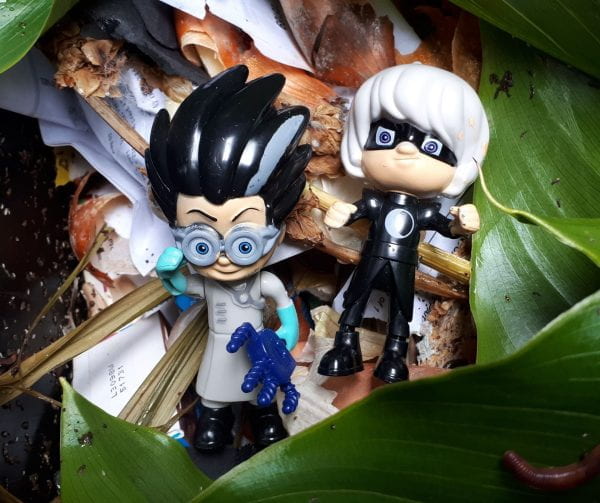
The Battle Between Good and Evil in Your Compost Bin
By Caroline Norton-Smith, 2019 Alumni.
There are types of bacteria in your compost bin, fighting it out for supremacy.
Aerobic bacteria – the force for good.
Anaerobic bacteria – the force for evil.
And there is only one thing that separates them.
Air!
The force for good
Just like aerobic exercise where you breathe lots of air in and out, aerobic bacteria are heavy breathers. They use oxygen from the air and carbon from the organic matter in your compost bin as sources of energy. This energy fuels their good work of freeing up nutrients, like nitrogen and phosphorus, to feed growing plants.
Let’s meet our three aerobic superheros. Their Latin names are the secret to how their superpowers work.

Psychrophilic Bacteria
Psychro means cold, Philic means love = The Cold Lover.
He kicks off the composting process at temperatures between 0 and 20 degrees centigrade. He works slowly, producing a low level of heat that builds up creating power for the next superhero.
Mesophilic Bacteria
Meso means middle, Philic means love = The Warm Lover.
Between 20-40 degrees centigrade, Mesophilic Bacteria breaks down organic matter to create proteins, carbohydrates, carbon dioxide and the most important power: heat. When things get too hot, she steps back and hands things over to our final superhero.
Thermophilic Bacteria
Thermo means heat, Philic means love = The Heat Lover.
Thermophilic Bacteria powers through composting and creates a lot of heat. He loves temperatures between 40 and 70 degrees centigrade.
It takes a lot of energy to keep the heat for Thermophilic Bacteria; he needs around a square meter of organic matter and plenty of oxygen.
If there is not enough organic matter, he can’t keep the heat up and hands the power back to Mesophilic Bacteria.
The villainous anaerobic bacteria are lurking.
While the superheros are busy composting, the villains are waiting quietly in the background. The villains do their composting without oxygen, and breathe out the bad boys of greenhouse gasses: methane and carbon dioxide.

They know that our composting superheroes need at least five percent oxygen to survive. When all the fresh air is consumed, the heroes are weakened and die off. This allows the villains to take over. When this happens, things get stinky. When your compost smells like a swamp, you know the villains are in control.
The villains prosper amongst the rubbish in landfill sites. Layers and layers of rubbish cut off the oxygen supply. If you tie your organic matter up in a plastic bag, the villains will get them.
The villains have a fatal flaw; oxygen kills them. If you can get fresh air into the compost bin, the villains are weakened and die. The heroes will fight back and win the battle.
Keep fighting the good fight
How do you keep your compost bin safe from the clutches of evil?
- Add air to your compost by turning it with a garden fork or spade.
- Avoid adding anything that could smother your compost, like oily food.
- Don’t let your compost get too wet. The superheros like a bin of 40-60% moisture.
- If it gets wet, add dry organic material like autumn leaves or shredded paper.
The Force for Good will prevail
The superheros are more efficient at composting than their villainous enemy. As long as they have access to oxygen and organic matter, the forces of good will prevail.
Categories